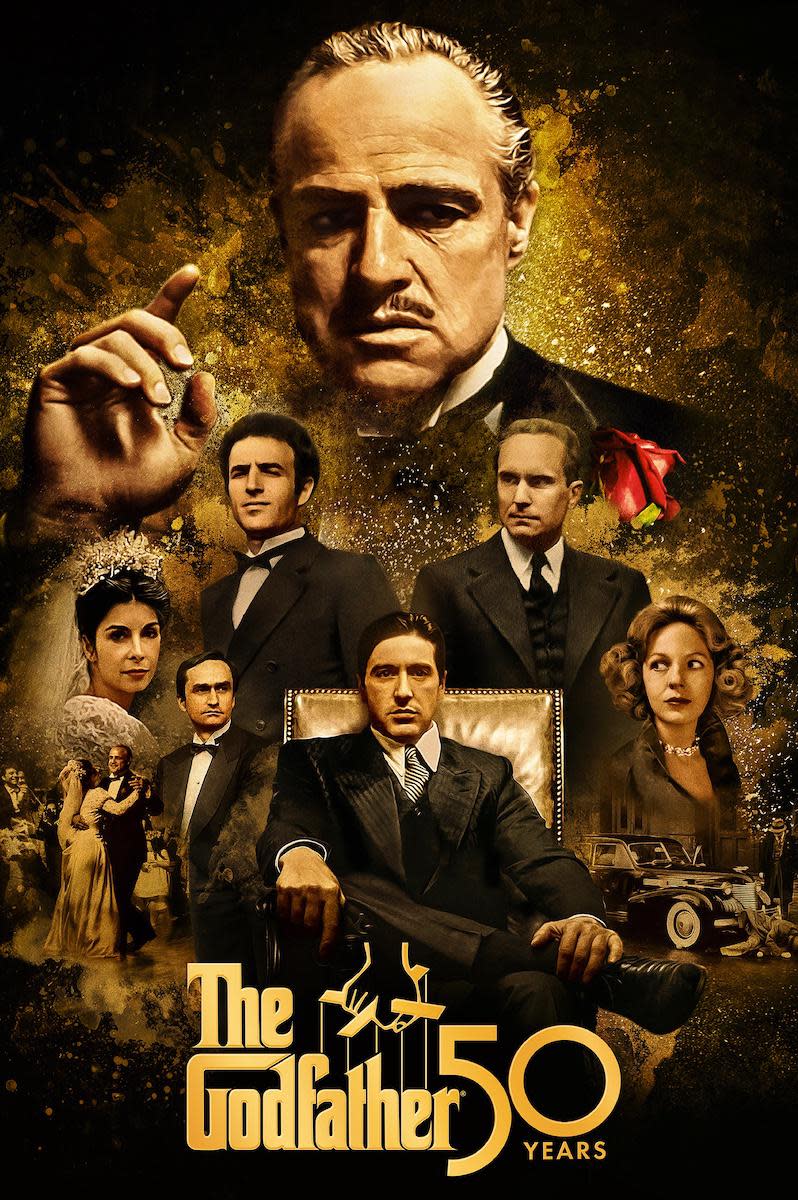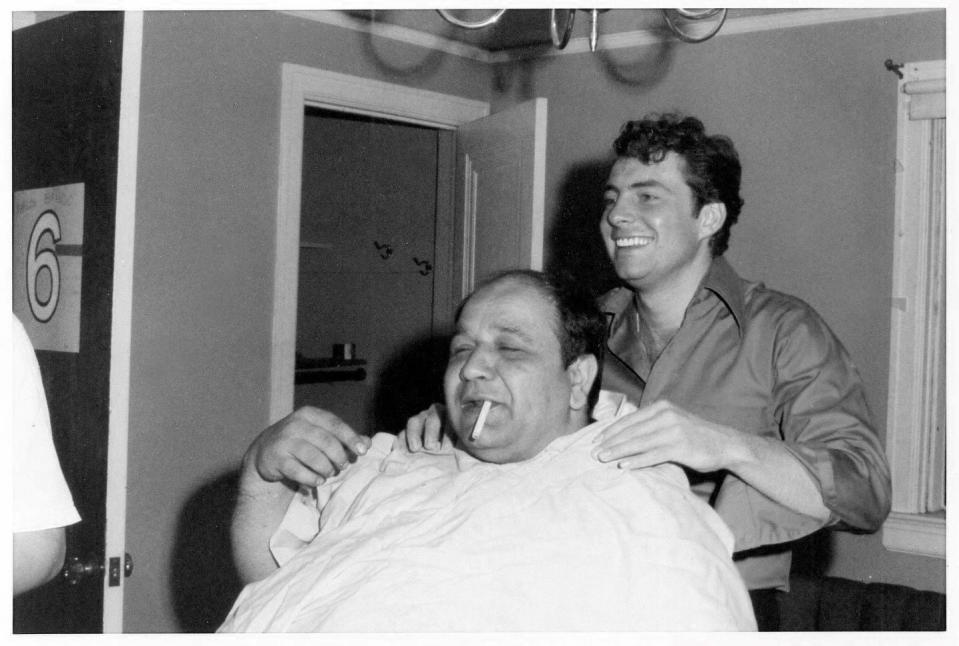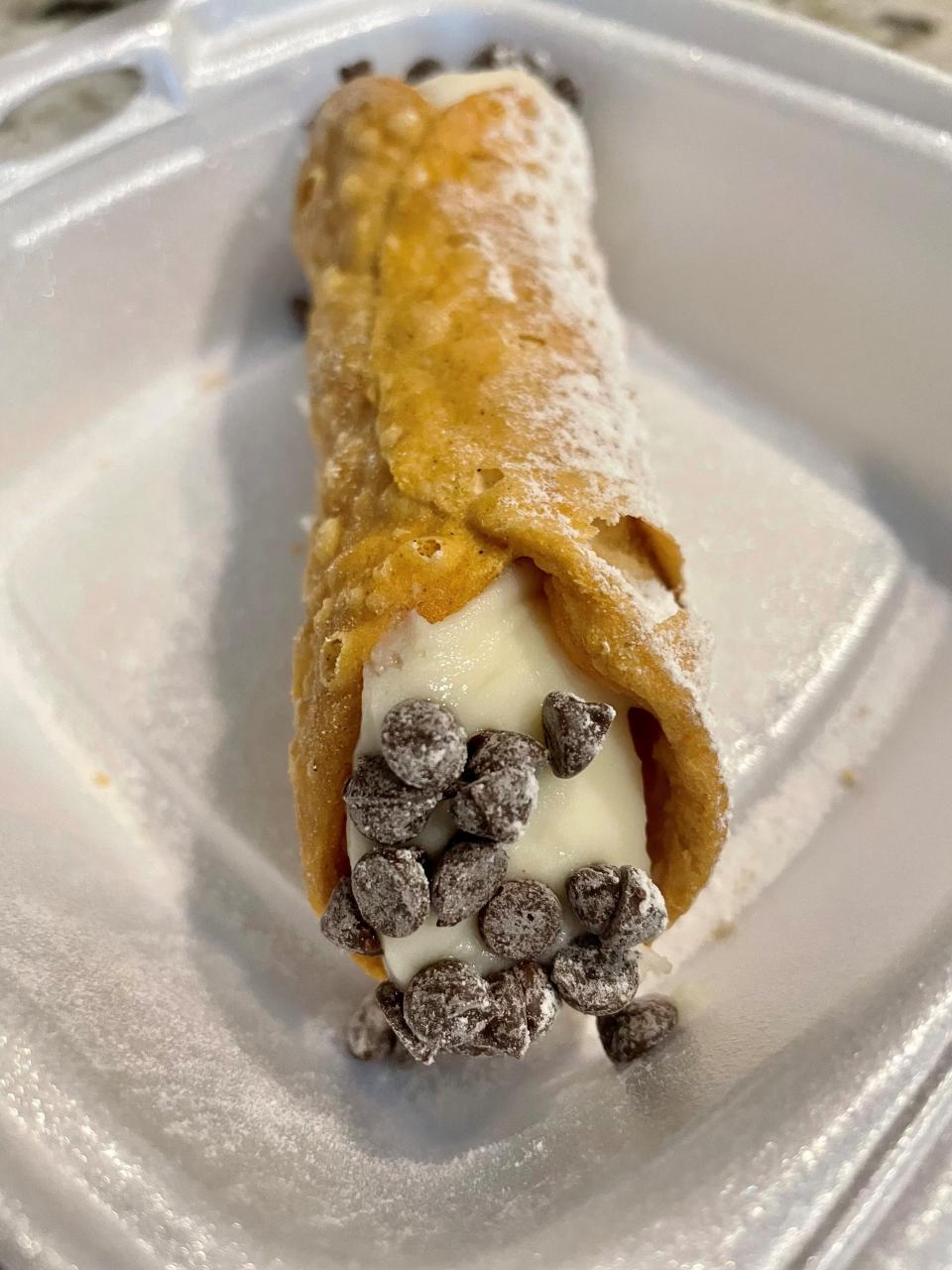'Leave the gun, take the cannoli': Why iconic 'Godfather' line is key to the entire movie
- Oops!Something went wrong.Please try again later.
- Oops!Something went wrong.Please try again later.
- Oops!Something went wrong.Please try again later.
"What are they getting so excited about? It's only another gangster picture," said Marlon Brando.
America's greatest actor, yes. But not always as shrewd off-screen as he was on. "The Godfather," celebrating its 50th anniversary Thursday, is not a gangster picture. It is a family picture — where the family happens to be gangsters.
As proof of which, take a look at the film's most iconic line.
"Leave the gun, take the cannoli."
It may hold the secret to the entire movie, said author Mark Seal, whose book "Leave the Gun, Take the Cannoli: The Epic Story of the Making of The Godfather" (Simon & Schuster) is further proof that "The Godfather" is anything but a run-of-the-mill crime flick.

"It's about the gun, but even more it's about the cannoli," Seal said. "It's about the family. That's what makes 'The Godfather' so enduring — and strangely endearing. You end up becoming part of this family."
No other gangster picture, none of the James Cagney or Edward G. Robinson classics, comes near "The Godfather." People have seen it 30, 40, 50 times. A newly restored high-definition version was released by Paramount in February, and on Thursday, it's showing at theaters around the country (see a list at the end of the story).
And when people aren't watching it, they're quoting it.
"This is a very quotable movie," said Sterling Farrance, a critic and educator who wrote an entire essay dissecting this one scene, "Leave the Gun, Take the Cannoli: The Hit Man as Family Man."
"I'm gonna make him an offer he can't refuse." "Luca Brasi sleeps with the fishes." "What have I ever done to make you treat me so disrespectfully?" "May your first child be a masculine child." The sheer number of catch-phrases says something about the film's cultural staying power.
But "leave the gun, take the cannoli," a throwaway line that was half-improvised, has become to "The Godfather" what "To be or not to be" is to "Hamlet." The quote of quotes.
"It's interesting that that's the line that sticks out in people's minds," Farrance said. "It really does distill so much about what's happening in that film."
Six words
What that line sums up —in six words — is the entire cognitive dissonance on which "The Godfather" turns. Domesticity and death, side by side.
It comes, you'll recall, at the climax of a long sequence leading up to the whacking of Paulie (John Martino), a mob toady who has made the unforgivable mistake of betraying the family.

Clemenza (Richard S. Castellano), the assassin, is — like all the associates of Mafia kingpin Don Corleone (Brando) — a family man.
He's shown leaving the driveway of his nice suburban home. "What time are you gonna be home tonight?" his wife asks, blowing him a kiss. "I don't know, probably late," he says. "Don't forget the cannoli," she reminds him. "Yeah, yeah, yeah, yeah," he grunts, as Paulie — the lamb to the slaughter — backs the car out of the driveway. "Watch out for the kids when you're backin' out," Clemenza says.
Ordinary husband, from an ordinary neighborhood, going out on an ordinary errand. The extended version of this sequence, which can be seen in the 1977 edited-for-TV version "The Godfather Saga," actually shows Clemenza going into the Luna Restaurant in Little Italy to pick up the cannoli for his wife
Line, please
The line isn't in Puzo's book. In the original shooting script, apparently, it was simply "Leave the gun." Point being, the Corleone family is leaving the body, the car, and the murder weapon in plain sight, as a warning to their enemies.

It was the late actor Richard Castellano who, apparently, added the bit about the cannoli.
"That line cements what was the subtext of the film, and lays it out literally in the text," Farrance said.
The subtext? This is a film about family. The crime, the killing — all of it is to keep the family together.
Local connection: Did you know these famous movies, shows, and people have a Ukraine connection?
Tell-all: Gianni Russo, 'Godfather' actor and mob associate, spills it all on tape
Where is he going?: We mapped Tony Soprano's route home in New Jersey. Here's what's wrong
It's the way the murder, the horror, the bloodshed, rub up against the warm domestic scenes — homicide and hearth, so to speak — that made "The Godfather" so unsettling, so unlike any previous gangster film ("The Sopranos" took this theme and really ran with it). Putting guns and cannoli within six words of each other nailed it.
"It was the essence of everything," Seal writes in his book. "The wife, the kids, the fathers, the mothers, the kitchens, the families, and the food, always the food, and the extremes to which men had to go to put food on the table."
Ultimately, it's what makes "The Godfather" and its 1974 sequel, "The Godfather Part II," so tragic. The story arc of the "Godfather" films is that, by committing terrible crimes to preserve his family, Michael Corleone (Al Pacino) ends up losing it.
Keeping it real
But the "Godfather" films are not just about a family. They're about an Italian family.
That's been a source of ongoing controversy among some Italian American viewers, who complain that Italian families are not like that (most aren't, of course).
But just as many have embraced "The Godfather" as a warm, idealized portrait of the Italian family circle. "Uncle Floyd" Vivino, the comedian-pianist from Paterson, used to announce that he was going to play "The Italian national anthem" before launching into "The Godfather" theme.
That's another thing about the "cannoli" line. It's culturally specific. It's not, "leave the gun, take the dessert." Cannoli — crusty tubular pastries with sweet ricotta filling — happened to be director Francis Ford Coppola's favorite when he was a kid. That's why he left the line in.
Throughout the film, Coppola, screenwriter Puzo, and their largely Italian cast went out of their way to make sure the film hit all the right cultural notes.
For the long, memorable wedding scene that opens the film, Coppola made sure that the place was full of children. Kids, he said, would never be left behind on such an occasion. "The kids at an Italian wedding have the run of the place," he said. Elsewhere, when the script had Clemenza "browning" some sausages, Puzo insisted it be changed to "fry." "Gangsters don't brown, gangsters fry," he said.
For their pains, the "Godfather" team got the ultimate compliment: a thumbs-up from the mobsters themselves.
"I left the movie stunned, I mean I floated out of the theater," said Mafia underboss Salvatore "Sammy the Bull" Gravano, as quoted in "The Annotated Godfather" screenplay, edited by Jenny M. Jones.
"Maybe it was fiction, but for me, then, that was our life," he said. "Not just the mobsters and the killing and all that [expletive], but that wedding in the beginning, the music and the dancing, it was us, the Italian people!"
Devil's in the details
Of course, no film can get everything right. "The Godfather" lost a smidgen of credibility when a scene that was supposed to be set on the George Washington Bridge was instead filmed on what is obviously the Queensboro. "Goin' to Jersey?" Michael says, concerned — as well he might be. The Queensboro connects Long Island City to Manhattan. Puzzling.
Speaking of which, a final mystery. Is it "leave the gun, take the cannoli"? Or "leave the gun, take the cannolis"? People quote it both ways.
Technically, "cannolo" is singular, "cannoli" is plural. There is no such thing as "cannolis." But Pete Clemenza — admirable as he is many ways — might not be a stickler for language. So it could be "cannolis." As a throwaway line, it's a bit hard to make out.
But Seal, author of "Leave the Gun, Take the Cannoli," is pretty sure there's no "s."
Sure enough to render it that way —in the title of his book about the greatest gangster saga of all time. Pardon. Family saga.
"I think it's cannoli," he said. "If you listen, it's hard to tell. But I think that's it."
"The Godfather: 50 Years" is playing at theaters in the following locations, among others:
Montclair
Cherry Hill
East Hanover
Hawthorne
Rockaway
West Orange
Clifton
Edison
Hillsborough
Skillman
Westwood
Cranford
Elizabeth
Linden
Toms River
East Brunswick
Freehold
Newark
Voorhees
New York
Brooklyn
New York
West Nyack
Carmel
Middletown
Port Chester
New City
Pennsylvania
Allentown
Butler
Lititz
Plymouth Meeting
Camp Hill
Mount Lebanon
Pottsgrove
Bensalem
Center Valley
Philadelphia
Bloomsburg
Cranberry Township
Pittsburgh
Delaware
Dover
Maryland
Annapolis
Bethesda
Gaithersburg
Baltimore
Columbia
Largo
Jim Beckerman is an entertainment and culture reporter for NorthJersey.com. For unlimited access to his insightful reports about how you spend your leisure time, please subscribe or activate your digital account today.
Email: beckerman@northjersey.com
Twitter: @jimbeckerman1
This article originally appeared on NorthJersey.com: 'The Godfather' at 50 years: Why no other gangster movie comes close

